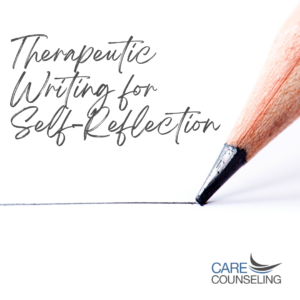Therapeutic Writing for Self-Reflection
 Writing has a profound impact on our ability to understand, process, and heal from life’s experiences. Therapeutic writing, also known as expressive writing, is a powerful tool that can help individuals explore their thoughts, emotions, and inner worlds. In this blog post, we will delve into the concept of therapeutic writing, its benefits, and how it can be a transformative practice for self-reflection and personal growth.
Writing has a profound impact on our ability to understand, process, and heal from life’s experiences. Therapeutic writing, also known as expressive writing, is a powerful tool that can help individuals explore their thoughts, emotions, and inner worlds. In this blog post, we will delve into the concept of therapeutic writing, its benefits, and how it can be a transformative practice for self-reflection and personal growth.
What is Therapeutic Writing?
Therapeutic writing is a form of self-expression that involves putting thoughts and feelings into words on paper or a digital platform. It provides individuals with an opportunity to explore their innermost thoughts, reflect on their experiences, and gain insight into their emotions and behaviors. Therapeutic writing is not about grammar, structure, or producing polished prose; it is about the process of self-discovery and healing through words.
The Benefits of Therapeutic Writing for Self-Reflection
- Emotional Release: Writing allows individuals to release pent-up emotions and thoughts. By putting feelings into words, people can experience a sense of relief and catharsis.
- Increased Self-Awareness: Writing provides a space for self-reflection and introspection. It encourages individuals to delve deep within themselves to gain a better understanding of their thoughts, motivations, and desires.
- Clarity and Perspective: Writing can help individuals gain clarity on complex issues and see them from different angles. It often brings hidden patterns and connections to the surface.
- Stress Reduction: Engaging in therapeutic writing can reduce stress and anxiety. It provides a healthy outlet for processing difficult emotions and experiences.
- Problem Solving: Writing about challenges and conflicts can lead to insights and potential solutions. It’s a way to brainstorm and organize thoughts.
- Healing and Coping: Therapeutic writing can be a valuable tool for coping with trauma, grief, or difficult life events. It can facilitate the healing process by allowing individuals to express their pain and process their experiences.
How to Practice Therapeutic Writing for Self-Reflection
- Choose a Comfortable Setting: Find a quiet and comfortable space where you won’t be easily distracted. Create an environment that feels safe and conducive to self-expression.
- Set Aside Time: Dedicate a specific time for therapeutic writing. Whether it’s in the morning, before bed, or during a break, consistency can help establish the practice.
- Select Your Medium: Decide whether you prefer writing with pen and paper or typing on a computer. Some individuals find the tactile experience of handwriting more therapeutic, while others prefer the speed and ease of typing.
- Start with Prompts or Free Writing: If you’re unsure where to begin, consider using prompts to get started. Prompts can be specific questions or open-ended statements that guide your writing. Alternatively, you can engage in free writing, where you simply write whatever comes to mind without censoring or editing.
- Write Freely: When writing therapeutically, there are no rules or constraints. Write whatever is on your mind, even if it feels disorganized or fragmented. Let your thoughts flow without judgment.
- Be Honest and Vulnerable: Therapeutic writing is most effective when it’s honest and raw. Don’t be afraid to explore difficult emotions and painful experiences. Vulnerability in your writing can lead to deeper self-discovery.
- Reflect on Your Writing: After writing, take time to reflect on what you’ve written. What insights have you gained? How do you feel now compared to before you started writing? What patterns or themes emerge from your writing?
- Establish a Routine: Consistency is key. Make therapeutic writing a regular practice in your life, whether it’s daily, weekly, or as needed. Over time, you may notice the cumulative benefits of this practice.
Prompts for Therapeutic Writing
If you’re unsure how to start, here are some prompts to spark your therapeutic writing journey:
- Describe a recent situation that triggered strong emotions. How did you react, and why?
- Write a letter to your younger self, offering guidance, love, or reassurance.
- Explore a challenging relationship in your life. What dynamics are at play, and what emotions are involved?
- Reflect on a significant life event or transition. How did it impact you, and what have you learned from it?
- Write about something you’re grateful for and why it holds meaning in your life.
- Describe a recurring dream or thought that has been on your mind. What do you think it represents?
Therapeutic writing is a transformative practice that allows individuals to engage in self-reflection, gain insight, and promote emotional healing. By putting thoughts and emotions into words, individuals can explore their inner worlds, confront challenges, and develop a deeper understanding of themselves. Whether you’re facing a specific issue or simply seeking personal growth, therapeutic writing is a valuable tool for self-discovery and well-being



























